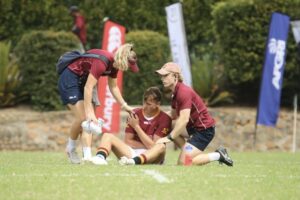Introduction
Our first Setanta Student Story of 2024 features Rian Wolfaardt, a student on our MSc in Performance Coaching and currently working as a strength and conditioning coach at Paul Roos Gymnasium in Stellenbosch.
Below, Rian provides an insight into his journey in sport and how his career has developed in the last number of years.
A Passion for Performance
Sport has been a central part of Rian’s life from an early age, continuing on throughout his school and university days.
“During my time at school and university, the performance environments through sporting activities captured my attention. Initially I thought I wanted to pursue a career in physiotherapy and the injury side of sport, but realised that I had greater interest in the athletic performance side.”
His first steps into coaching was through rugby skills coaching at high school level.
“I coached from a tactical and technical perspective whilst studying Sport Science at Stellenbosch University. After completing my Sport Science undergraduate and honours degrees, I transitioned into the role of a strength and conditioning coach to pursue athletic development.”

Diverse Coaching Experiences
Throughout his career, Rian has primarily worked with youth athletes, particularly those aged between 13 and 19. Rian’s coaching journey has brought experiences across a range of different sports, including rugby, netball, water polo, and cricket.
“In 2021 I had the opportunity to intern at Stellenbosch Academy of Sport (SAS) for a year, and got to work with the SAS rugby union and rugby sevens teams, as well as be a part of the Junior Springboks (SA u20) campaign for that year. I also assisted in athletic performance testing for the national netball side. After this, I got strength and conditioning role at Paul Roos Gymnasium, where I mainly work with athletic development in rugby, water polo and cricket. In June, I got an opportunity to work with Western Province Rugby Union in the Grant Khomo Under 16 Tournament, where I worked with the under 16 youth rugby teams.”
As his career has progressed, so too have his roles and responsibilities.
“My role has changed from mainly assisting in strength and conditioning duties to designing and implementation of athletic development plans, capturing and monitoring of performance data, as well as assessing and implementing methods to reduce the risk of injury.”
Rian’s early experiences working with youth athletes continue to shape his coaching style.
“Working with youth athletes has taught me the importance of adaptability and individuality within athletic development,” he outlines. “Athletes within a youth system can vary dramatically in terms of maturation and development, and it is important to develop an approach that allows all individuals to progress so that they can perform at the highest level possible.”
Pursuing a Master’s Programme
So, what led Rian to pursue an MSc in Performance Coaching with Setanta? He shares, “I had never felt an urge to pursue an MSc as I felt that it would not improve my overall skillset in the strength and conditioning industry.” He was drawn to Setanta’s approach, explaining, “Through the MSc in Performance Coaching, I have refined my current skillset, as well as broadened my knowledge and understanding regarding other aspects of the S&C industry that were barely touched on in my previous education.”
He outlines how the flexibility of the programme has helped him to excel both professionally and academically.
“The balance between working and studying has been difficult at times, but is very manageable. The staff at Setanta College are very understandable when it comes to deadlines clashing with sporting events or competitions, making it possible to do your best work and not have to rush. The modules are all online, and can be viewed in a “class” setting, via pdf documents, and even via audio. These options make it possible for anyone to keep up with the work in their own time.”
Advice for Aspiring Coaches
For anyone interested in becoming an S&C coach he outlines the importance of applying theoretical knowledge in real-world scenarios.
“Look to gain practical experience as soon and as often as possible while studying. Application of knowledge can often be the most difficult part of S&C coaching, and the more experience you can get, the more comfortable you will become. Always look to expand your knowledge and be open to other S&C coaches views and methods, while maintaining and adjusting your own when necessary.”
Rian Wolfaardt is a student on the MSc in Performance Coaching. Learn more about the programme here.


Leave A Comment